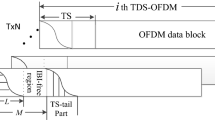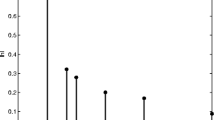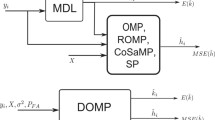Abstract
In this paper, we propose a space-alternating generalized expectation maximization (SAGE) based joint channel estimation and data detection algorithm in compressive sensing (CS) framework for orthogonal frequency-division multiplexing (OFDM) systems in rapidly time-varying sparse multipath channels. Using dynamic parametric channel model, the sparse multipath channel is parameterized by a small number of distinct paths, each represented by the path delays and path gains. In our model, we assume that the path gains rapidly vary within the OFDM symbol duration while the number of paths and path delays vary symbol by symbol. Since the convergency of the SAGE algorithm needs statistically independent parameter set of interest to be estimated, we specifically choose the discrete orthonormal Karhunen–Loeve basis expansion model (DKL-BEM) to provide statistically independent BEM coefficients within one OFDM symbol duration and use just a few significant BEM coefficients to represent the rapidly time-varying path gains. The resulting SAGE algorithm that also incorporates inter-channel interference cancellation updates the data sequences and the channel parameters serially. The computer simulations show that our proposed algorithm has better channel estimation and symbol error rate performance than that of the orthogonal matching pursuit algorithm that is commonly proposed in the CS literature.






Similar content being viewed by others
References
Li, Y., Cimini, L. J., & Sollenberger, N. R. (1998). Robust channel estimation for OFDM systems with rapid dispersive fading channels. IEEE Transactions on Communications, 46(7), 902–915.
Edfors, O., Sandell, M., van de Beek, J. J., Wilson, S. K., & Böjesson, P. O. (1998). OFDM channel estimation by singular value decomposition. IEEE Transactions on Communications, 46, 931–939.
Li, Y. (2000). Pilot-symbol-aided channel estimation for OFDM in wireless systems. IEEE Transactions on Vehicular Technology, 49(4), 1207–1215.
Morelli, M., & Mengali, U. (2001). A comparison of pilot-aided channel estimation methods for OFDM systems. IEEE Transactions on Signal Processing, 49(12), 3065–3073.
Yang, B., Letaief, K. B., Cheng, R. S., & Cao, Z. (2001). Channel estimation for OFDM transmission in multipath fading channels based on parametric channel modeling. IEEE Transactions on Communications, 49(12), 467–479.
Chen, J.-T., Paulraj, A., & Reddy, U. (2001). Multichannel maximum-likelihood sequence estimation (MLSE) equalizer for GSM using a parametric channel model. IEEE Transactions on Communications, 47(1), 53–63.
Chen, N., Zhang, J., & Zhang, P. (2008). Improved channel estimation based on parametric channel approximation modeling for OFDM systems. IEEE Transactions on Broadcasting, 54(2), 217–225.
Liu, S., Wang, F., Zhang, R., & Liu, Y. (2008). A simplified parametric channel estimation scheme for OFDM systems. IEEE Transactions on Wireless Communication, 7(12), 5082–5090.
Jakobsen, M. L., Laugesen, K., Manchon, C. N., Kirkelund, G. E., Rom, C., & Fleury, B. (2010). Parametric modeling and pilot-aided estimation of the wireless multipath channel in OFDM systems. Proceedings of IEEE ICC 2010, Cape Town, South Africa.
Berger, C. R., Zhou, S., Preisig, J., & Willett, P. (2010). Sparse channel estimation for multicarrier underwater acoustic communication: From subspace methods to compressed sensing. IEEE Transactions on Signal Processing, 58(3), 1708–1721.
Cotter, S. F., & Rao, B. D. (2002). Sparse channel estimation via matching pursuit with application to equalization. IEEE Transactions on Communications, 50(3), 374–377.
Wu, C.-J., & Lin, D.W. (2006) A group matching pursuit algorithm for sparse channel estimation for OFDM transmission. Proceedings of IEEE ICASSP 2006, Toulouse, France.
Li, W., & Preisig, J. C. (2007). Estimation of rapidly time-varying sparse channels. IEEE Transactions on Oceanic Engineering, 32(4), 927–939.
Sharp, M., & Scaglione, A., (2008) Application of sparse signal recovery to pilot-assisted channel estimation. Proceedings of the IEEE ICASSP, Las Vegas, USA.
Taubock, G., Hlawatsch, F., Eiwen, D., & Rauhut, H. (2010). Compressive estimation of doubly selective channels in multicarrier systems: Leakage effects and sparsity-enhancing processing. IEEE Journal of Selected Topics in Signal Processing, 4(2), 255–271.
Cheng, P., Chen, Z., Rui, Y., Guo, Y. J., Gui, L., Tao, M., et al. (2013). Channel estimation for OFDM systems over doubly selective channels: A distributed compressive sensing based approach. IEEE Transactions on Communications, 61(10), 4173–4185.
Hu, D., Wang, X., & He, L. (2013). A new sparse channel estimation and tracking method for time-varying OFDM systems. IEEE Transactions on Vehicular Technology, 62(9), 4648–4653.
Zhou, F., Tan, J., Fan, X., & Zhang, L. (2014). A novel method for sparse channel estimation using super-resolution dictionary. EURASIP Journal on Advances in Signal Processing, 2014(29), 1–11.
Panayirci, E., Senol, H., & Poor, H. V. (2010). Joint channel estimation, equalization and data detection for OFDM systems in the presence of very high mobility. IEEE Transactions on Signal Process, 58(8), 4225–4238.
Şenol, H., Panayırcı, E., & Poor, H. V. (2012). Non-data-aided joint channel estimation and equalization for OFDM systems in very rapidly varying mobile channels. IEEE Transactions on Signal Process, 60(8), 4236–4253.
Şenol, H., Çırpan, H. A., & Panayırcı, E. (2005). A low complexity KL-expansion based channel estimator for OFDM systems. EURASIP Journal on Wireless Communication Networking, 2005(2), 163–174.
Zemen, T., & Mecklenbrauker, C. F. (2005). Time-variant channel estimation using discrete prolate spheroidal sequences. IEEE Transactions on Signal Process, 53(9), 3597–3607.
Giannakis, G. B., & Tepedelenlioglu, C. (1998). Basis expansion models and diversity techniques for blind equalization of time-varying channels. Proceedings of the IEEE, 86(10), 1969–1986.
Tang, Z., Cannizzaro, R. C., Leus, G., & Banelli, P. (2007). Pilot-assisted time-varying channel estimation for OFDM systems. IEEE Transactions on Signal Process, 55(5), 2226–2238.
Hijazi, H., & Ros, L. (2009). Polynomial estimation of time-varying multipath gains with intercarrier interference mitigation in OFDM systems. IEEE Transactions on Vehicular Technology, 58(1), 140–151.
Fessler, J. A., & Hero, A. O. (1994). Space-alternating generalized expectation-maximization algorithm. IEEE Transactions on Signal Process, 42(10), 2664–2677.
Author information
Authors and Affiliations
Corresponding author
Rights and permissions
About this article
Cite this article
Şenol, H. Joint Channel Estimation and Symbol Detection for OFDM Systems in Rapidly Time-Varying Sparse Multipath Channels. Wireless Pers Commun 82, 1161–1178 (2015). https://doi.org/10.1007/s11277-015-2273-x
Published:
Issue Date:
DOI: https://doi.org/10.1007/s11277-015-2273-x




